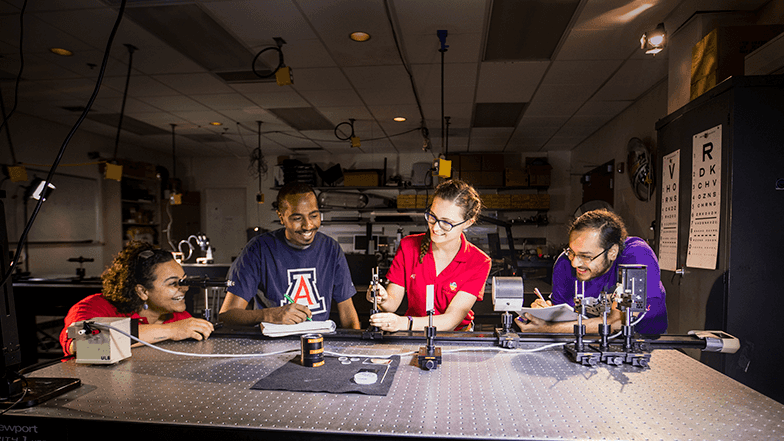A Real-World Competition: Engineering Design Day

One of Engineering’s Biggest Showcases
The Craig M. Berge Design Program is a two-semester-long senior capstone course (ENGR 498 A/B) where students work on a wide variety of real-world, industry-sponsored engineering projects. The program concludes on Design Day, when close to 100 student teams present their finished projects, competing for trade recognition and cash awards – nearly $50,000 this year.
It takes a lot to get to Design Day, when Wildcats create proposals to prototypes to compete for industry recognition and accolades. But most of all, it requires teamwork.
Student Perspective: Collaborating with Engineers on a Project
Name: Gabriella Vindiola
Hometown: Tucson
College: College of Engineering
Major: BS in Mechanical Engineering
Graduation: Spring 2022
Design Day Project: Elephant Pellet Dispersal Unit
Team Role: Project Lead
Teaming Up on a Truly Wild Project
The competition is a little like a job interview, right? How did you find your team?
The course starts off with a "career fair"-style open house where students can meet all the different projects' sponsors. Students give their resumes to the sponsors in hopes that the sponsor will select them to be a member of the team. At the end, every student accepts an invitation to be on a team or is assigned a team. The process itself is a bit intimidating because it feels like a job interview, but it's pretty exciting once you get your team and your project!
Briefly describe your team’s project.
Here is our project's description from the Design Day Booklet: Elephants walk extreme distances in wild habitats foraging for food. In order to simulate a more realistic environment for the elephants at the Reid Park Zoo, a device is needed that launches food pellets to various locations (within their habitat area) based on a programmable system. This will provide the desired result of elephant exercise, requiring them to search for food, and decreasing dependence on human interaction.
Beneficial Differences
Describe your team. How did your different roles contribute to your success?
Our team was made up of two mechanical engineering students, one industrial engineering student, one computer engineering student, and one electrical engineering student.
Working across the different disciplines for this project has been very beneficial because we cannot really do one thing without the others. The mechanical engineering components of the project need to be compatible with the electrical and computer engineering components. We have enjoyed working together and challenging each other to think outside the box.
Do any project challenges stand out?
In some cases, engineering companies sponsor projects. Their student teams have access to their engineers and resources when they get stuck during the design and manufacturing process. Our team did not have that. Whenever we ran into engineering or technical problems with our device, we either had to outsource advice or search the internet for advice. However, we did have the Elephant Caretaker team helping us in the design process. Their experience with elephants, input, and support was incredibly important.
Real-Life Experience
Tell us what you will take away from the experience.
This program was incredibly hands-on and gave a real-life application of what it would be like to be an engineer. This project allowed us to practice an elevator pitch and interviewing during the open house.
- We were able to take an idea and work with it from the ground up.
- We had to learn how to meet the requirements of the “client” while also being realistic about what we could deliver.
- We had to learn how to work with a budget and spend strategically.
- We had to learn how to brainstorm and prototype our design.
- We had to learn how to work together and combine engineering disciplines where someone may not know as much as someone else about a particular topic.
These skills are important and can be applied to a dream job.
University of Arizona students are doers with access to experiences, resources, and strong industry connections only a top-ranked research institution like ours can offer. Does working as a team to take on real-world challenges excite you? Join us. Become a Wildcat.
Visit the College of Engineering Interdisciplinary Capstone website to learn more about The Craig M. Berge Design Program and see all the team projects and Design Day results.
